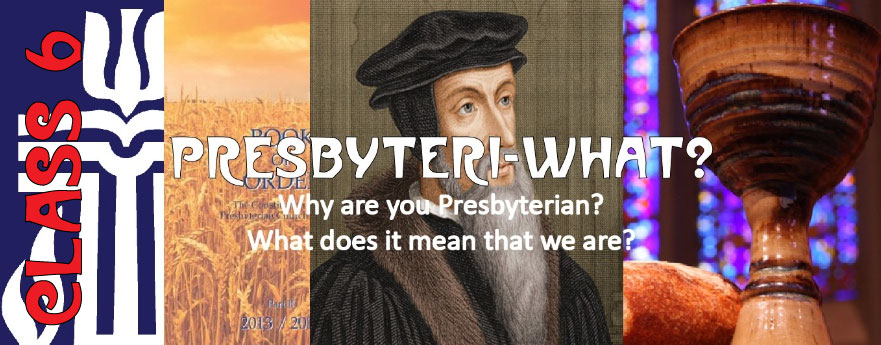PUTTING IT ALL TOGETHER. Why are you Presbyterian? What does it mean that we, as a church community, are? Before we answer that question, let’s refresh our memory on what we’ve already covered in our Presbyteri-what-conversation:
In our first session, we did a rapid review of THE REFORMATION, our HISTORICAL EMERGENCE. The Church already was, it has been since the experience of the resurrected Jesus. What was different was a resistance to, rejection of and reformation of how the Catholic church had become in late Renaissance Europe. Calls to reformation had occurred for centuries, prior the 16th century, but they’d been squashed or subverted. The final star was the urgent papal fundraising effort to pay for the construction costs of St Peter’s Cathedral in Rome) through the use of indulgences as a fundraising tool in the “dispensation” of God’s grace. It was a reaffirmation of the mystery, paradox and promise of God’s grace known as a gift, through Christ alone, via the Word of God and as the way that God saves/delivers/fulfills us. There was a rejection of the ecclesiastical hierarchy as superior, the papacy as the ultimate discerning authority and religious iconography, the unquestioned authority of tradition, an affirmation of emerging vernacular languages This return to the word and the word alone led to an explosive, iconoclastic, reversal of how church was lived out which tragically was often quite violent. From this often clashing movement is also issued our historic importance upon the freedom of conscience of the minority.
Our second session addressed THEOLOGY: Martin Luther, John Calvin (and countless others) shaped a theology that was based upon a rediscovery of God’s word and the message of Grace in Christ Jesus experienced therein and thereby. Grace as the means of salvation became key in the readings of scripture, with Jesus as the hermeneutical key or means of interpretation.
In the third class we discussed POLITY and our FORM OF GOVERNMENT: the system of rules, based upon collective beliefs and shared values that govern an association or group of people. The Church is a community of people, gathered by God, called to a particular common task or way of being. Christ alone is the head of the Church. Polity is how we identify, live and act together as mutually interdependent people both saved and called by grace to a new way of life. It reflects our history and is built upon our theology.
In the fourth class we discussed WORSHIP: what we call both our work together on Sunday morning and also what we can call every moment of every day, no matter what we do or where we are. It’s our response to God and God’s initial action. Our corporate or communal worship, is organized around the Word and our preparation to hear it as a community, its proclamation, our listening, our response to it and the sealing of it in our hearts and lives via the sacraments.
In the fifth class we attacked the idea of DISCIPLINE: the theological word we use to describe the community wide responsibility of the church for sharing faithful Christian life. Extraordinary and ordinary, individual and communal, for clergy and lay people – it’s how we all hold each other accountable, nourish our shared faith and live out the gospel in a mutually interdependent and missional way.
And so we come to the end of our class, turning to look at the ways in which our Presbyterian Church (for us the Presbyterian Church of the United States of America [PC(USA)]) is struggling with our shared identity and common gospel witness today in our postmodern, post-Christian and increasingly post-denominational culture Some of our sister congregations are leaving the PC(USA) over how we attempt to articulate and live out our historical background, theological affirmation of Jesus as Lord and polity (worship, discipline and form of government) in today’s world. Some are leaving for other denominations, some reaffirm their Presbyterian identity by staying, revolving around questions of sexuality, marriage, pluralism, finances, property and the means and ends of Christian mission.
ADDITIONAL READINGS FOR GOING DEEPER:
- Most Detailed :: Sexuality is not the only, nor the primary, issue at the root of our current divisions and difficulties. And it is one that most people are quickest to identify and discuss. Here is a very thoughtful, detailed summary of the issue(s): “What Christians Think About Homosexuality – Six Representative Viewpoints” by L. R. Holben, 1999.
QUESTIONS FOR PONDERING:
- Why are you a Presbyterian follower of Jesus?
- What does it mean that we, as a church community, are?
